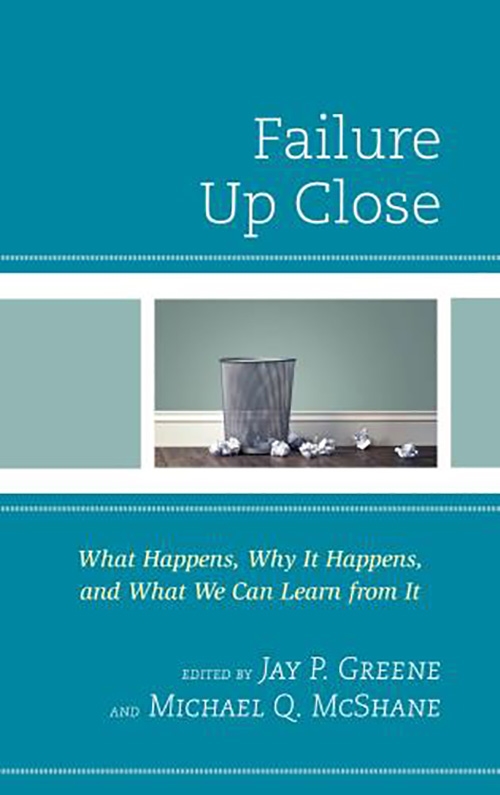A new book co-edited by a University of Arkansas professor and his former student encourages education researchers, practitioners and policymakers to take stock of failed attempts at education reform "to create a culture in which failures can be acknowledged and from which lessons can be drawn."
Jay Greene is a Distinguished Professor of education reform who holds an endowed chair in the Department of Education Reform, and Michael McShane directs national research at EdChoice. EdChoice, formerly the Friedman Foundation for Educational Choice, is based in Indianapolis. McShane earned a doctorate in education policy from the U of A in 2013.
Failure Up Close, published by Rowman & Littlefield, contains chapters presented by leading education policy researchers at a daylong conference on the topic in May 2017 in Kansas City. The authors represent a diversity of ideas about how education policy works and differ in the values they most wish to promote, according to the editors.
Frederick Hess and Paige Willey of the American Enterprise Institute wrote about the tendency to defer to expertise in education policy, a flawed way of thinking because that reliance doesn't work as well as it does in fields such as dentistry and engineering. Policy is a complicated string of issues and no one possesses expertise across all of those matters. This flawed thinking leads to a series of policy failures, as opposed to a single failure, they write.
Other chapters cover more specific examples of failed improvement efforts including Martin West of Harvard University's description of the federal education policy No Child Left Behind as a failure by any definition. The math and reading standardized tests required by the policy provided only partial and imperfect information about school quality, and the policy also gave schools an incentive to distort activities to try to raise test scores.
Anna Egalite, another graduate of the U of A education policy program, wrote a chapter identifying private school choice programs as failures because they produce small benefits that don't meet the expectations of supporters. Egalite is an assistant professor at North Carolina State University. She says the problem is poor program design and implementation but proposes that education savings accounts offer a promising mechanism for expanding access to private school choice.
Greene and McShane summarize key lessons from the book in their conclusion:
- Be humble, which means not overstating goals of an initiative and, further, creating conditions that foster success rather than trying to engineer particular outcomes.
- Be "Bayesian," referring to mathematician Thomas Bayes' probability theory that, in education reform, should be interpreted to mean that ideas about how the American education system works should be tested so that assumptions can continually be updated.
- You can't end-run democracy, which means you have to secure sincere political support for a policy in order for it to be successful.
- You can't hide behind technocracy, or rule by experts, which means action must be guided by human judgment, not by a formula.
"The purpose here is not to argue that nothing will ever work or that all sins can be washed away by saying that success is context dependent," the book concludes. "Rather, we hope that readers will examine policies with humility, recognizing that even though policy has its limits, it can positively affect outcomes. We hope that they will also have more faith, and invest more time and energy, in our political process to put policies through the necessary paces and get them enacted with real support."
Topics
Contacts
Heidi S. Wells, director of communications
College of Education and Health Professions
479-575-3138,
